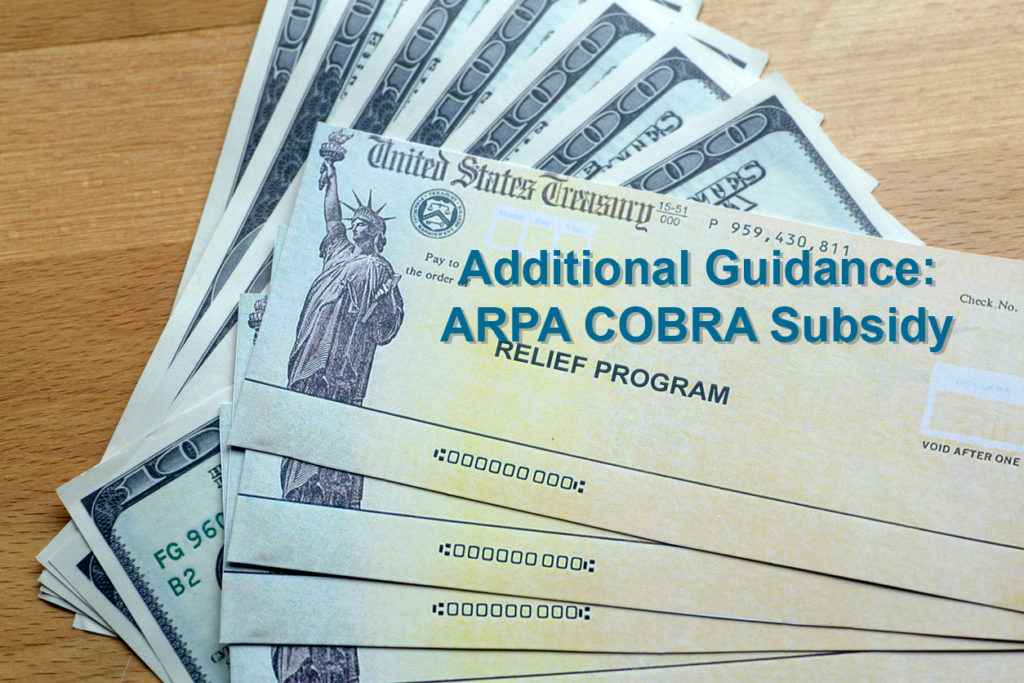On July 26, 2021, in Notice 2021-46 (the “Notice”), the IRS issued additional guidance for the American Rescue Plan Act (APRA) COBRA subsidy. The COBRA subsidy is effective from April 1, 2021 – September 30, 2021 so there are approximately two months left of the six-month subsidy. The Notice provides guidance on eligibility for the subsidy and who may claim the subsidy credit for certain situations.
- Second qualifying events – due to the COVID-19 pandemic, the DOL and IRS (and approved by HHS) issued guidance in 2020 that gave individuals an extension of time for enrolling in and paying for COBRA and notifying the plan administrator or insurer of certain qualifying events such as divorce, child aging out, or disability. See our previous blog about the extended period of time. Family members who lost coverage because a spouse or parent lost coverage due to an involuntary termination or reduction in hours are AEIs. If these family members incurred a second qualifying event such as divorce or aging out of the plan, they will get an extension of time for COBRA, e.g., 36 months. If a former employee or family member is disabled, that person receives 29 months of COBRA coverage. Even if AEIs are not currently enrolled or paying for COBRA, they may enroll or start payments again if their extended COBRA coverage would be in place between April 1, 2021 – September 30, 2021. These AEIs will be eligible for the subsidy as long as they are not eligible for other major group health coverage or Medicare.
In the first IRS Notice 2021-31, the IRS took the position that these individuals who incurred a second qualifying event or disability “and remained on COBRA” were eligible for the subsidy. See Notice 2021-31, QA-17. In the latest guidance Notice 2021-46, the IRS has indicated that all individuals who still have a right to enroll in COBRA and/or make COBRA payments between April 1, 2021 – September 30, 2021, are eligible for the subsidy, unless eligible for other major group health coverage or Medicare. In other words, they don’t need to be currently enrolled in COBRA and making payments. This may require employers to offer these AEIs COBRA coverage and the subsidy if the employer or plan administrator are notified by these individuals of such events. (QA-1)
- End of COBRA subsidy for dental/vision – in the prior IRS Notice 2021-31, the IRS did not specifically address whether an AEI is eligible for the subsidy for dental and vision if they are eligible for major health coverage or Medicare. In the new Notice 2021-46, the IRS specifically addresses this issue and indicates that the subsidy will end for dental and/or vision coverage if the AEI becomes eligible for other major group health coverage or Medicare. (QA-2)
- Comparable State continuation coverage – a subset of State residents may qualify for the COBRA premium subsidy if they are in a State program that provides coverage comparable to Federal COBRA coverage. (QA-3)
Questions and Answers about Claiming the Subsidy
The Notice provides guidance on various questions about who may claim the ARPA subsidy. Below is a brief explanation about each question and answer.
- Common law employer – defined as the common law employer of the AEI and who may claim the subsidy. (QA-4)
- State-mandated continuation coverage if plan is also subject to Federal COBRA – employer claims the subsidy even after the Federal COBRA ends and the AEI pays the premiums directly to the insurer. (QA-5)
- Controlled group of businesses with single health plans – each member is a separate common law employer and is eligible to claim the subsidy for its own employees. (QA-6)
- Group health plan which covers unrelated employers – common law employer is eligible to claim the subsidy. (QA-7)
- Entity provides health benefits to employees of another entity but is not a third-party payer – separate employers covered under the health benefits may claim the subsidy. (QA-8)
- Business reorganization where seller is obligated to continue COBRA for the merger and acquisition beneficiaries – the seller who maintains the group health plan may claim the subsidy. (QA-9)
- State agency that is required to provide Federal COBRA where COBRA members would typically remit the premiums directly to the State agency – the State agency is eligible to claim the subsidy, not the common law employer (if other than the State agency). (QA-10)
- Small Business Health Options Program (SHOP) – employer may be eligible to claim the subsidy if they meet certain requirements. (QA-11)
Employers and service providers need to quickly determine if these changes will impact their subsidy administration.
See our prior articles for additional subsidy information:
Overview of IRS Guidance for COBRA Subsidy under ARPA
COBRA Premium Subsidy Under the American Rescue Plan Act of 2021
DOL Provides Model Notices and FAQs for ARPA COBRA Subsidy
IRS Guidance for COBRA Subsidy: Involuntary Terminations and Reduction of Hours
TRI-AD and our Associates’ suggestions or recommendations shall not constitute legal advice. No content on our website can be construed as tax or legal advice and TRI-AD may not be considered your legal counsel or tax advisor. Clients are encouraged to consult with their tax advisor and/or attorney to determine their legal rights, responsibilities, and liabilities. This includes the interpretation of any statute or regulation, federal, state or local; and/or its application to the clients’ business activities.

